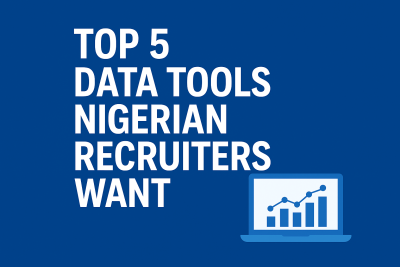
SOPHIA OLISE
 Data Analysis
Data Analysis
 0 comment
0 comment
 02 Sep, 2025
02 Sep, 2025

In Nigeria’s growing digital economy, recruiters are searching for candidates with data analysis skills that go beyond theory. To stand out in today’s job market, you must know the tools that employers value most. Whether you’re a beginner or a professional, mastering these tools will boost your chances of landing top opportunities.
Excel remains the foundational tool for data analysis in Nigerian companies, from small businesses to multinational corporations. Recruiters expect candidates to be skilled in pivot tables for summarizing large datasets, VLOOKUP/XLOOKUP for merging information from different tables, and advanced formulas for complex calculations. It’s not just for beginners—many companies still use Excel daily for financial reporting, sales dashboards, and HR analytics. Its widespread adoption makes it the common language of business, and proficiency proves you can manage and report data in a familiar, accessible format. An analyst who can automate tasks using macros or build insightful reports with dynamic charts is a highly valued asset.
With its powerful visualization features, Power BI has become the undisputed leader in Nigeria’s corporate sector. Its seamless integration with Microsoft products, which many Nigerian companies already use, gives it a significant advantage.
Recruiters love candidates who can build interactive dashboards and generate insights for decision-making. These dashboards allow executives to explore data on their own, quickly answering questions and tracking key performance indicators. The ability to connect to various data sources and create clean, professional reports is a skill that directly translates to a better salary.
Structured Query Language (SQL) is the engine behind data-driven decisions. As businesses scale and their data moves to large, relational databases, SQL becomes essential for working with that data efficiently. Nigerian recruiters often list SQL as a non-negotiable skill for data analysts in industries like finance and fintech. It’s the primary way to extract, manipulate, and analyze data stored in corporate systems. Mastering SQL shows recruiters you can handle large datasets without relying on slow, manual methods, making it a top tool to master.
As data grows more complex, Python has become a must-have for automation, predictive modeling, and advanced analytics. Companies in tech, fintech, and research value candidates who can use Python libraries like Pandas for data cleaning and manipulation and Matplotlib or Seaborn for creating sophisticated visualizations. Python is a powerful, flexible tool that empowers analysts to go beyond standard reporting and uncover deeper trends. Knowing Python demonstrates a candidate's readiness to handle complex data challenges and work with large volumes of information.
While Power BI dominates in Nigeria due to its lower cost and seamless integration with other Microsoft products, Tableau is still highly respected and sought after. Recruiters in multinational companies and top-tier consultancies often prefer candidates who know Tableau for global analytics projects. It is a powerful visualization tool known for its stunning, custom dashboards and superior performance when working with large datasets. While its licenses are more expensive than Power BI's, its reputation for delivering cutting-edge analytics makes it a significant skill for anyone aiming for a career with an international organization.
These tools are more than just software—they’re the keys to landing your dream data role in Nigeria. Recruiters aren’t only looking for certifications but also real proof of skill application through projects and portfolios. By mastering these five tools and building a portfolio that showcases your proficiency with real-world data, you can significantly boost your chances of success in Nigeria’s thriving digital economy.
Whether you're starting or upgrading your tech skills, you can begin your learning journey with us today.
Review Affordable Tech Course with us at ECR Academy We provide the hands-on, project-focused training you need to master tech skills like Digital Marketing, Web development, Data Analysis, Cybersecurity.
Build Comprehensive Digital Solutions with ECR Technology Services Limited Let us help you bring your brand, business, or idea online with professional digital solutions such as secure, responsive websites, robust mobile applications, high-impact digital marketing templates, and specialized Learning Management Systems (LMS).
Contact Us Today:
Start with Excel, then progress to Power BI and SQL. Once comfortable, move into Python for advanced analytics.
No. Learn progressively. Recruiters value depth in a few tools rather than shallow knowledge in all.
Free resources can help you start, but structured training (like at ECR Academy) provides hands-on practice and mentorship that employers value.
Currently, Power BI and SQL are the most requested in Nigerian job listings.
Certifications add value but aren’t enough alone. Recruiters prefer candidates with a portfolio of real-world projects.
SOPHIA OLISE
Data Analyst
Olise Sophia Amarachi is a passionate and purpose-driven data analyst and digital skills advocate based in Nigeria. With a strong foundation in Excel, Power BI, and SQL, she empowers others—especially young people and corps members—through practical training, tech mentorship, and values-based leadership. Sophia’s journey into data analysis began during her NYSC year in Abia State, where she committed herself to learning and growing from scratch. Today, she shares her knowledge through online classes, challenges, and hands-on projects, including dashboards and reports that translate complex data into clear insights.
0 comment